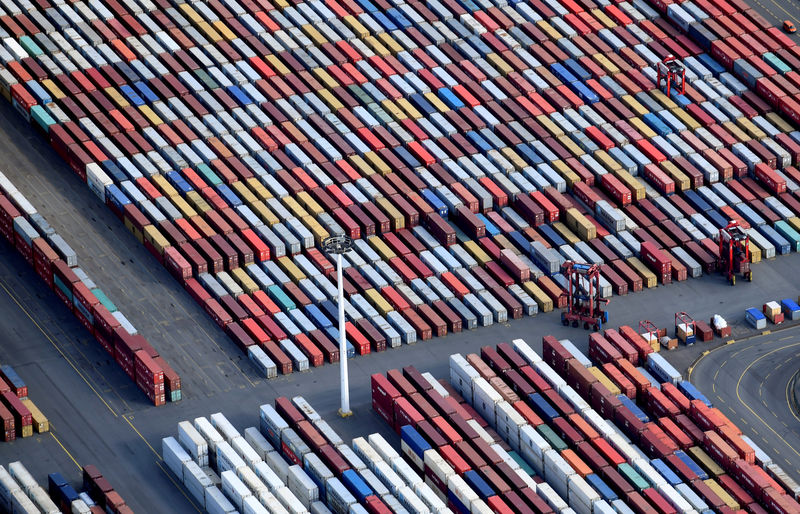By Paul Carrel and Reinhard Becker
BERLIN (Reuters) - German exports fell by more than expected in August, data showed on Thursday, reinforcing expectations that a manufacturing slump is pushing Europe's largest economy into recession.
Reliant on exports, German factories are suffering from a slowing world economy and uncertainty linked to the trade dispute between the United States and China, as well as Britain's planned but delayed exit from the European Union.
The Federal Statistics Office said seasonally adjusted exports fell 1.8% on the month while imports rose 0.5%. The trade surplus narrowed to 18.1 billion euros ($19.9 billion) after an upwardly revised 20.5 billion euros in the prior month.
A Reuters poll of economists had pointed to a 1.0% drop in exports and a 0.2% fall in imports. The trade surplus was expected to come in at 19.1 billion euros.
The economy shrank by 0.1% in the second quarter, and recent data has pointed to continued weakness in manufacturing in the third quarter. Most economists define a recession as two straight quarters of contraction in gross domestic product (GDP).
"We will likely have a contraction in GDP in the third quarter, and thus a recession," said Uwe Burkert, economist at LBBW, a bank.
August's drop in exports was the steepest since April. A regional breakdown of annual trade figures showed the biggest slump in exports - a 4.8% drop - was to so-called 'third countries' beyond the European Union, which include China.
Data published on Monday showed German industrial orders fell more than expected in August on weaker domestic demand.
Prolonged weakness in Germany, a bellwether for the economic health of the euro zone, would be a headache for the European Central Bank, which in September pledged indefinite stimulus to revive the bloc's economy.
With the ECB already deploying hefty monetary stimulus, economists and German business lobby groups have urged Chancellor Angela Merkel to ditch her policy of no new debt and borrow to fund a stimulus package for the economy.
Last Wednesday, leading economic institutes slashed their growth forecasts for the economy for this year and next, blaming weaker global demand for manufacturing goods and increased business uncertainty linked to trade disputes.
The institutes also called on the coalition government to take on more debt if the growth outlook deteriorates. It has so far refused to do so.
Merkel's government has managed to raise public spending without incurring new debt since 2014, thanks to an unusually long growth cycle, record-high employment, buoyant tax revenues and the European Central Bank's bond-buying plan.
But with the economy slowing and tax revenues waning, the fiscal room to counter a recession is getting smaller. At the same time, Germany's borrowing costs have turned into premiums, which means investors are actually willing to pay the state a bonus for being able to lend it billions of euros.
